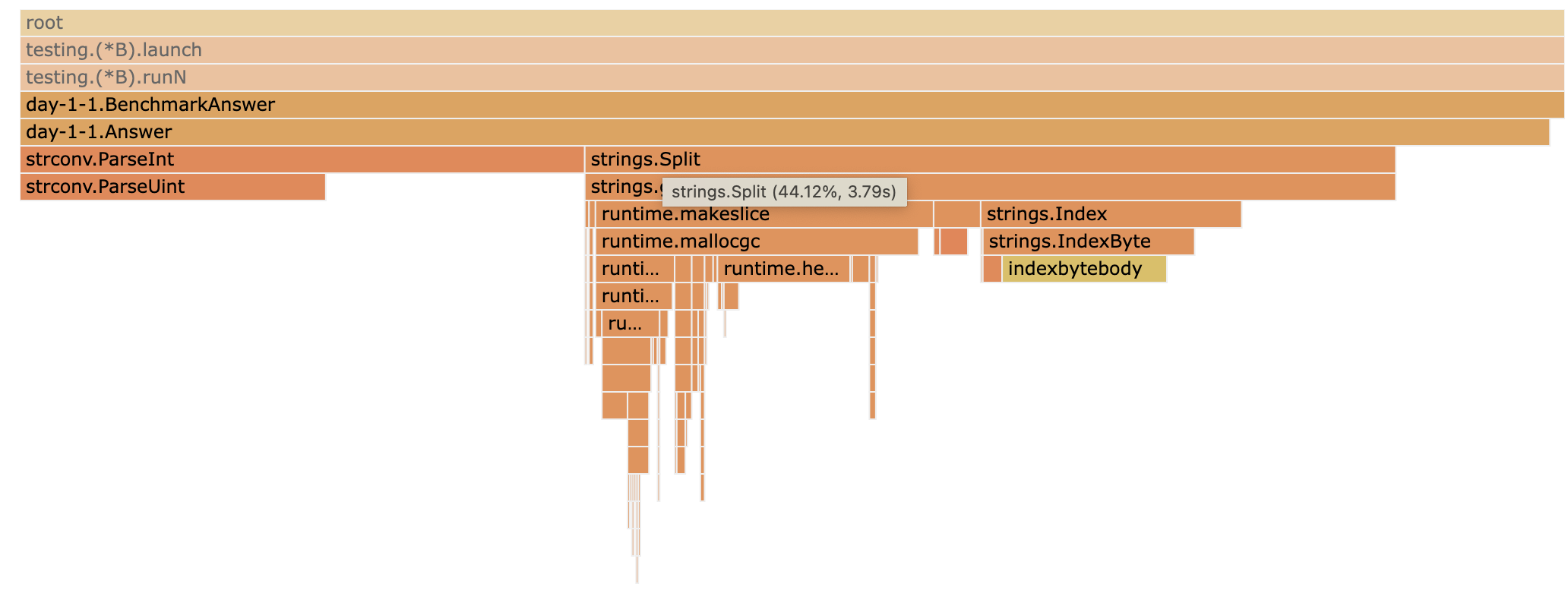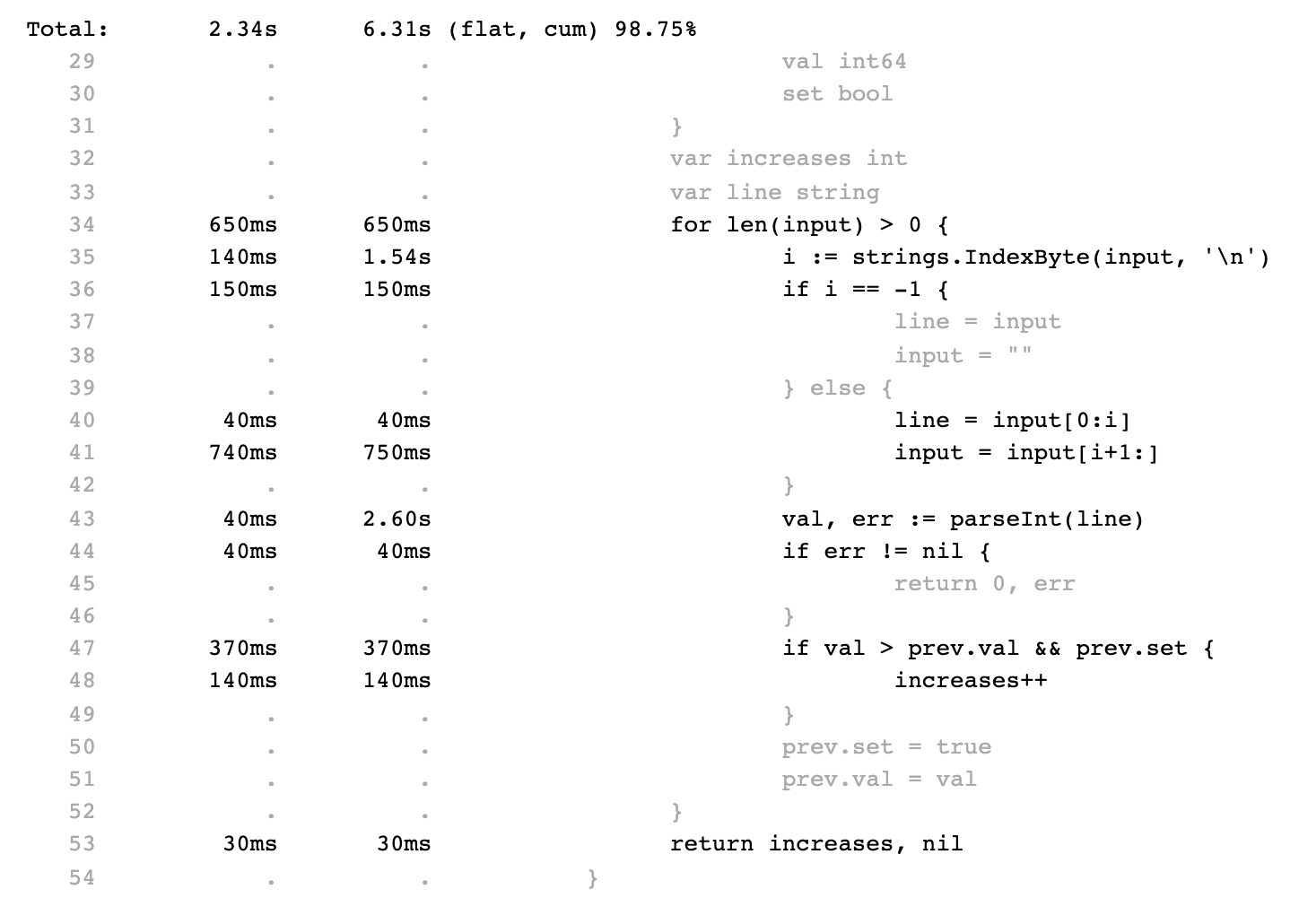
Advent of Go Profiling: Day 1-1
Published:Tis the season to be geeky, so it’s time for Advent of Code 2021. My theme for last year was to learn some rust, but for this year I decided to focus on Go profiling.
The idea is to code up naive solutions and use Go profiling tools to optimize them. A few folks on twitter were interested in seeing the results as blog posts, so I’m hoping to write a few of these.
You can find all code and profiles in the history of this repository: github.com/felixge/advent-2021.
Disclaimer: I currently work on Continuous Go Profiling for Datadog, but I’m not barking on behalf of my employer here.
v1: Naive Solution (link to code)
The day 1-1 challenge is pretty easy to solve, so I quickly came up with a naive solution, see below.
func Answer(input string) (int, error) {
var prev struct {
val int64
set bool
}
var increases int
for _, line := range strings.Split(input, "\n") {
val, err := strconv.ParseInt(line, 10, 64)
if err != nil {
return 0, err
}
if val > prev.val && prev.set {
increases++
}
prev.set = true
prev.val = val
}
return increases, nil
}
This works, but is it fast enough? Let’s run a benchmark.
$ go test -count 5 -run '^$' -bench . -cpuprofile=v1.cpu.pprof > v1.txt
$ benchstat v1.txt
name time/op
Answer-6 325ns ± 1%
While this may not seem bad to you, it’s definitely not Christmas Scale™️, so let’s figure out what we can optimize by looking at our CPU profile as a FlameGraph:

Looks like 44% of our time is spend in strings.Split(), let’s optimize this.
v2: Optimize strings.Split() (link to code)
Looking at the FrameGraph above, notice that strings.Split() calls strings.IndexByte() which is implemented in assembly. Turns out we can call this directly to do our own newline separation:
func Answer(input string) (int, error) {
var prev struct {
val int64
set bool
}
var increases int
var line string
for len(input) > 0 {
i := strings.IndexByte(input, '\n')
if i == -1 {
line = input
input = ""
} else {
line = input[0:i]
input = input[i+1:]
}
val, err := strconv.ParseInt(line, 10, 64)
if err != nil {
return 0, err
}
if val > prev.val && prev.set {
increases++
}
prev.set = true
prev.val = val
}
return increases, nil
}
This is a bit more complicated, but let’s see what this gives us:
$ benchstat v1.txt v2.txt
name old time/op new time/op delta
Answer-6 325ns ± 1% 168ns ± 2% -48.25% (p=0.008 n=5+5)
A 48% decrease in execution time — looks like we’re off to a good start! What’s next?

Seems like strconv.ParseInt() has become our new bottleneck.
v3: Optimize strconv.ParseInt() (link to code)
Even though the elves are not stating it explicitly, they are only giving us positive integers. So we could apply the same trick as before and call strconv.ParseUint() directly instead of going through strconv.ParseInt().
However, looking at the implementation of ParseUint it’s clear that it is doing a bunch of stuff to support different bases and bit sizes. We don’t need any of this, so let’s just implement the subset we actually need:
func parseInt(val string) (int64, error) {
var intVal int64
factor := int64(1)
for i := len(val) - 1; i >= 0; i-- {
c := val[i]
if c >= '0' && c <= '9' {
intVal += int64(c-'0') * factor
} else {
return intVal, fmt.Errorf("bad int: %q", val)
}
factor *= 10
}
return intVal, nil
}
Let’s see if it was worth it:
$ benchstat v2.txt v3.txt
name old time/op new time/op delta
Answer-6 168ns ± 2% 92ns ± 3% -45.29% (p=0.016 n=5+4)
Another 45% — we might be reaching Christmas Scale™️ here after all.
Can we do even better?

The FlameGraph above doesn’t give us any obvious clues for what to try next. But we can dig deeper. For example let’s take a look a look View -> Source:

As you can see we’re spending quite a bit of time on the sub-slice operation on line 41. Is this our next clue?
v4: The Nerd Snipe
The elves are informing me that the current solution over 3x faster than v1 — which is good enough for now:
$ benchstat v1.txt v3.txt
name old time/op new time/op delta
Answer-6 325ns ± 1% 92ns ± 3% -71.68% (p=0.016 n=5+4)
However they are willing to offer a special Go Profiling Star to anybody who manages to further improve upon v3. This is where you can come in. Just send me a link to your v4 solution in this twitter thread including your benchstats v3.txt v4.txt output and I will link to it from here.
- Valentin Deleplace’s solution with a
-87%delta against v3 - Gareth Lewin’s solution with a
-83%delta against v3 - Pontus Leitzler’s solution with a
-74%delta against v3 - @Fugiman’s solution with a
-50%delta against v3
Note: The perf delta results above are self-reported. In my own testing Valentin’s solution achieves a spectacular 14 ns/op and has -52% delta against Gareth’s solution.
That’s it for today. I’ll definitely only find time for doing a few of these posts, but I’ll try to keep them coming.
-- Felix GeisendörferSubscribe to this blog via RSS or E-Mail or get small updates from me via Twitter.